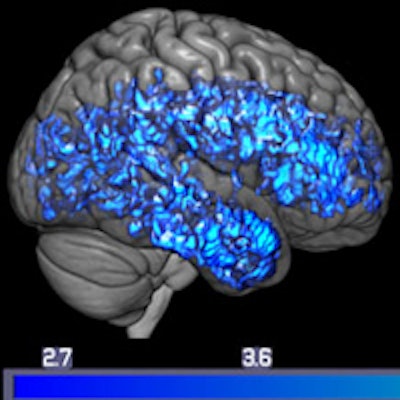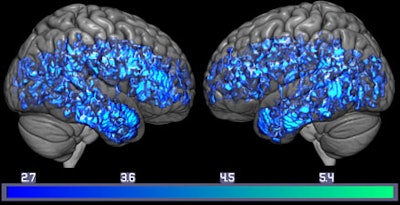
PET brain scans of people with mild cognitive problems show evidence of lower serotonin transporter levels, which can be an early indication of Alzheimer's disease or other dementias, according to a study published in the September issue of Neurobiology of Disease.
Previous studies have shown a loss of serotonin neurons in people with Alzheimer's and severe cognitive decline; however, it was unclear whether the loss was a cause or effect of the condition. The current study suggests lower serotonin transporter levels are a cause of the condition.
The group, led by Gwenn Smith, PhD, professor of psychiatry and behavioral sciences and director of geriatric psychiatry and neuropsychiatry at Johns Hopkins University, paired 28 participants (average age, 66.6 ± 6.9 years) with mild cognitive impairment with 28 healthy matched controls (average age, 66.2 ± 7.1 years). Approximately 55% of the subjects were men (Neurobiol Dis, September 2017, Vol. 105, pp. 33-41).
Each participant underwent an MRI scan to measure gray-matter volume and a PET scan to detect serotonin transporter levels and regional cerebral blood flow. The researchers also targeted the presence of beta amyloid, which has been associated with cognitive impairment.
 PET brain image shows decrease of serotonin transporters (blue) in the whole mild cognitive impairment group, compared with the whole healthy control group. Image credit: Gwenn Smith lab.
PET brain image shows decrease of serotonin transporters (blue) in the whole mild cognitive impairment group, compared with the whole healthy control group. Image credit: Gwenn Smith lab.Subjects with mild cognitive impairment showed up to 38% less of the serotonin transporter in the brain, compared with the age-matched controls. In addition, when Smith and colleagues compared the imaging results with memory tests, they found that lower serotonin transporter levels correlated with lower test scores. For example, subjects with mild cognitive impairment had 37% lower verbal memory scores and 18% lower levels of the serotonin transporter in the brain's hippocampus, compared with healthy controls.
The Johns Hopkins researchers suggested that finding ways to prevent the loss of serotonin or introduce a substitute neurotransmitter could slow or stop the progression of Alzheimer's disease and perhaps other dementias.




















